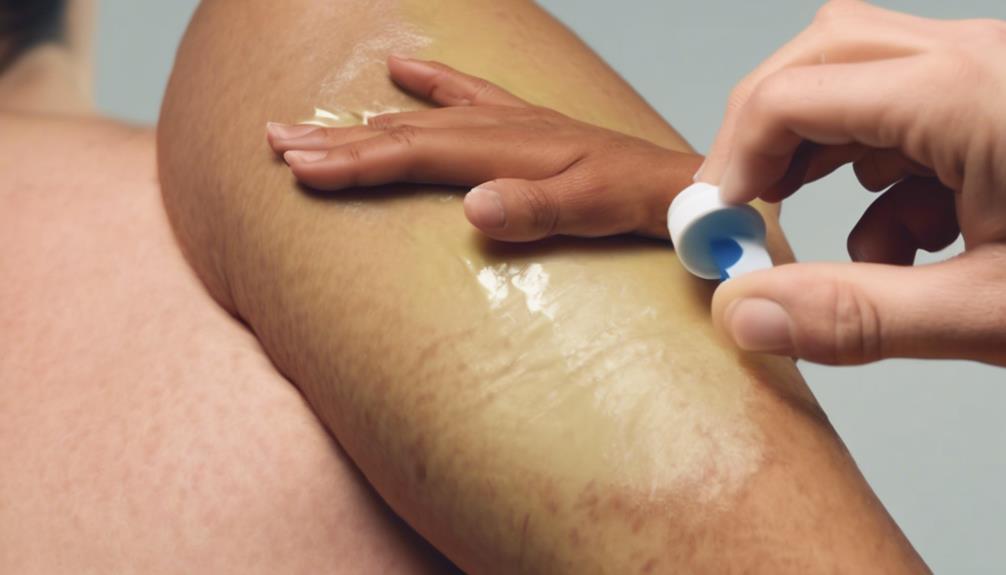Castor oil wraps have gained popularity in recent years as a natural remedy for various health concerns. Many people use castor oil wraps to alleviate pain, reduce inflammation, promote detoxification, and improve digestion. However, it is important to consider the safety of using castor oil wraps.
Castor oil itself is generally safe for external use, but when it comes to castor oil wraps, there are a few things to keep in mind. First, it is crucial to use high-quality, organic castor oil to minimize the risk of exposure to harmful chemicals or pesticides. Additionally, it is important to perform a patch test before applying the wrap to ensure that you are not allergic to castor oil.
When using castor oil wraps, it is essential to follow the instructions carefully and not exceed the recommended usage. Applying the wrap for longer durations or using it too frequently may lead to skin irritation or other adverse effects. Pregnant women, breastfeeding mothers, and individuals with certain medical conditions should consult their healthcare providers before using castor oil wraps.
As with any natural remedy, it is important to be aware of potential side effects. Some people may experience allergic reactions, skin irritation, or digestive discomfort when using castor oil wraps. If you notice any adverse reactions, it is recommended to discontinue use and consult a healthcare professional.
In conclusion, castor oil wraps can be safe when used correctly and with caution. It is important to use high-quality castor oil, perform a patch test, and follow the instructions provided. If you have any concerns or experience any adverse effects, it is best to consult a healthcare professional.
Key Takeaways
- Castor oil wraps have potential benefits such as improved circulation, reduced inflammation, enhanced detoxification, and pain relief.
- It is important to understand the ingredients and precautions of castor oil wraps, including performing a patch test, avoiding use on sensitive skin or open wounds, and consulting a healthcare provider if pregnant.
- Possible side effects and safety considerations of castor oil wraps include allergic reactions, skin irritation, digestive upset, and eye irritation. It is recommended to consult with a healthcare professional before starting any new treatment and to ensure the use of a pure and unadulterated castor oil product.
- To safely and effectively use castor oil wraps, it is advised to cleanse the skin before application, saturate the cloth evenly with castor oil, warm the oil slightly for better absorption, secure the wrap properly, and apply consistently according to recommended frequency.
Potential Benefits of Castor Oil Wraps

The potential benefits of castor oil wraps include, but are not limited to, improved circulation, reduced inflammation, and enhanced detoxification.
Castor oil is known for its detoxification benefits, as it stimulates the lymphatic system and aids in the removal of toxins from the body.
The application of castor oil wraps can help improve circulation by enhancing blood flow to the targeted area. This increased circulation can promote healing and provide pain relief by reducing inflammation and swelling.
Castor oil contains ricinoleic acid, a fatty acid that possesses anti-inflammatory properties, making it effective in relieving pain associated with conditions such as arthritis and muscle soreness.
In addition to its detoxification and pain relief benefits, castor oil wraps can also aid in promoting overall wellness. The application of heat during the wrap can help relax muscles, reduce stress, and improve sleep quality. Moreover, the oil’s moisturizing properties can nourish and hydrate the skin, promoting a healthy complexion.
It is important to note that while castor oil wraps have been praised for their potential benefits, individual results may vary. It is advisable to consult with a healthcare professional before incorporating castor oil wraps into your wellness routine, especially if you have any underlying medical conditions or are taking medication.
Understanding the Ingredients in Castor Oil Wraps
Understanding the ingredients used in castor oil wraps is essential for gaining insight into their potential effects and benefits. Castor oil wraps typically consist of a few key ingredients that work together to provide various therapeutic benefits.
Here are four important ingredients commonly found in castor oil wraps:
- Castor Oil: The main ingredient in castor oil wraps, castor oil is known for its anti-inflammatory and analgesic properties. It helps to reduce inflammation, relieve pain, and promote healing.
- Cloth or Bandage: The cloth or bandage used in castor oil wraps acts as a carrier for the castor oil. It helps to hold the oil in place and allows it to penetrate the skin.
- Heat Source: Applying heat to the castor oil wrap is often recommended to enhance its effectiveness. Heat helps to dilate blood vessels, improve circulation, and increase the absorption of the oil.
- Essential Oils (Optional): Some castor oil wraps may also include essential oils such as lavender or peppermint for added benefits. These oils can provide additional relaxation, pain relief, or antimicrobial properties.
Understanding the ingredients in castor oil wraps is crucial for assessing their effectiveness for detoxification and promoting lymphatic drainage. By knowing the role of each ingredient, individuals can make informed decisions about whether castor oil wraps are suitable for their specific needs.
Precautions to Take Before Using Castor Oil Wraps

Before using castor oil wraps, it is important to take certain precautions to ensure safety and maximize the potential benefits. While castor oil wraps are generally considered safe, there are a few precautions and contraindications to keep in mind.
Firstly, it is essential to perform a patch test before applying castor oil to a larger area of the body. This helps to identify any potential allergic reactions or skin sensitivities. Apply a small amount of castor oil to a small area of skin and wait for 24 hours to observe any adverse reactions.
Additionally, pregnant women should consult with their healthcare provider before using castor oil wraps. Although castor oil has been traditionally used to induce labor, its safety and effectiveness for this purpose are still debated. It is crucial to seek medical advice before using castor oil wraps during pregnancy.
Individuals with sensitive skin, open wounds, or skin infections should also avoid using castor oil wraps. The oil may cause further irritation or interfere with the healing process.
Lastly, it is important to properly clean and store the castor oil wraps to prevent contamination and maintain their effectiveness. Follow the manufacturer’s instructions for cleaning and storage to ensure optimal safety and hygiene.
Possible Side Effects of Castor Oil Wraps
Potential Adverse Reactions Associated with Castor Oil Wraps
When using castor oil wraps, it is important to be aware of potential side effects that may occur. While castor oil is generally considered safe for most people, some individuals may experience adverse reactions. Here are some side effects to watch out for:
- Allergic Reactions: Allergic reactions to castor oil are rare but possible. Symptoms may include itching, hives, swelling, or difficulty breathing. If you experience any of these symptoms after applying a castor oil wrap, it is important to discontinue use and seek medical attention immediately.
- Skin Irritation: Castor oil wraps may cause skin irritation in some individuals. This can manifest as redness, itching, or a rash at the application site. If you notice any signs of skin irritation, it is recommended to remove the wrap and cleanse the area with mild soap and water.
- Digestive Upset: Ingesting castor oil, which may occur if the wrap comes into contact with your mouth or if you accidentally swallow some, can lead to digestive upset. This may include symptoms such as nausea, vomiting, diarrhea, or abdominal cramps. If you experience any of these symptoms, it is advisable to drink plenty of water and consult a healthcare professional if they persist.
- Eye Irritation: Contact with castor oil wraps should be avoided around the eyes, as it can cause irritation. If the oil comes into contact with your eyes, rinse thoroughly with water and seek medical advice if irritation persists.
While castor oil wraps are generally safe, it is important to be aware of these potential side effects and discontinue use if any adverse reactions occur.
Tips for Safe and Effective Use of Castor Oil Wraps

To ensure safe and effective use of castor oil wraps, it is important to follow these guidelines.
- Always choose high-quality, cold-pressed castor oil for your wraps. This ensures that you are using a pure and unadulterated product.
- Before applying the wrap, cleanse the skin thoroughly to remove any dirt or impurities. This helps the castor oil penetrate the skin more effectively.
- When applying the castor oil wrap, make sure to saturate the cloth evenly with the oil. It is best to warm the oil slightly before application, as this can enhance its absorption.
- Next, place the saturated cloth over the desired area and secure it with plastic wrap or a bandage. Leave the wrap on for at least one hour, but overnight application is also common.
To maximize the benefits of regular use of castor oil wraps:
- Apply them consistently. For best results, use the wraps on a regular basis, such as three times a week or as advised by a healthcare professional.
- It is important to note that castor oil wraps should not be used by pregnant women or individuals with certain medical conditions.
- As always, consulting with a healthcare professional before starting any new treatment is recommended.
Frequently Asked Questions
Can Castor Oil Wraps Help With Weight Loss?
Castor oil wraps are often promoted as a weight loss aid, with claims that they can boost metabolism and reduce belly fat. However, the scientific evidence supporting these claims is limited, and more research is needed to determine their effectiveness.
Can Castor Oil Wraps Be Used During Pregnancy?
Castor oil wraps are often used for various purposes, but when it comes to pregnancy, it is important to exercise caution. While some claim that castor oil wraps can alleviate morning sickness and prevent stretch marks, the safety of their use during pregnancy is not well-established.
Can Castor Oil Wraps Help With Arthritis Pain?
Castor oil wraps have been used for joint inflammation and arthritis pain relief. While the effectiveness of these wraps may vary, some individuals have reported finding relief from their arthritis symptoms.
Can Castor Oil Wraps Be Used on Children?
Castor oil wraps for children should be approached with caution due to safety concerns. While there are potential benefits, it is important to consult with a healthcare professional to ensure proper usage and to address any concerns.
Can Castor Oil Wraps Improve the Appearance of Cellulite?
Castor oil wraps have been touted as a potential method for improving the appearance of cellulite, but the effectiveness debate continues. While some individuals claim positive results, further research is needed to determine their true efficacy.
Conclusion:Are Castor Oil Wraps Safe
In conclusion, castor oil wraps have the potential to offer various benefits, such as relieving pain and reducing inflammation.
However, it is important to understand the ingredients and take necessary precautions before using them.
While castor oil wraps are generally safe, there is a possibility of experiencing side effects, such as skin irritation or allergic reactions.
To ensure safe and effective use, it is recommended to consult with a healthcare professional and follow proper guidelines.
Remember, ‘an ounce of prevention is worth a pound of cure.’





